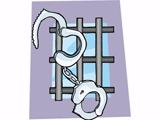Being a party to an offence or a crime is often referred to as aiding and abetting.
We think it is absolutely essential, particularly if you are young, to understand clearly how vulnerable you may be if you are simply with other  people who commit crimes or offences. You can get dragged in if you are not careful.
people who commit crimes or offences. You can get dragged in if you are not careful.
So read Section 66 carefully at the bottom of this page.
You could very well be criminally liable, and even sent to prison, for being a party to another person’s offending, even if you did not think you were doing anything wrong.
If you get involved in some way then you are at real risk of being a party to an offence or crime committed by another person
The law is not unfair but the younger you are the more care you have to take not to be "sucked in" by the criminal actions of another person.
There are obvious cases where a person who does not actually commit the crime is still clearly criminally guilty for aiding and assisting.
 If your friend breaks into a house and steals things (this is known as burglary), but you only act as a look out ready to warn him if the police come, then the law will find you just as guilty of the burglary as your friend.
If your friend breaks into a house and steals things (this is known as burglary), but you only act as a look out ready to warn him if the police come, then the law will find you just as guilty of the burglary as your friend.
We hope that this is obvious to you.
But there are a number of other perhaps more difficult fact situations which you might not realise could well lead you to getting into serious trouble.
The law of in relation to being are "party" to a crime is set out in section 66 of the Crimes Act 1961. We set out the full wording of that section below.
You should read both section 66(1) and 66(2) very carefully because both subsections deal with different fact situations.
Subsection 1 effectively deals with actually assisting somebody else to commit a crime. But be careful, because the Courts have held sometimes that simply giving weight in numbers by standing around a fight or an assault, could amount to you being a party to the actual assault. It depends on the circumstances.
It is usually said that 'mere presence' is not enough to be a party at an offence BUT we advise that you do not take the risk
Subsection 2 deals with the situation where you can be stuck with a criminal offence committed by someone else when you did not think that they were going to commit such events.
A clear example is this : If you and a friend decided to rob a bank  .....The first part of this topic has been displayed free of charge. Join up for $45 to have access to this and all other topics!
.....The first part of this topic has been displayed free of charge. Join up for $45 to have access to this and all other topics!